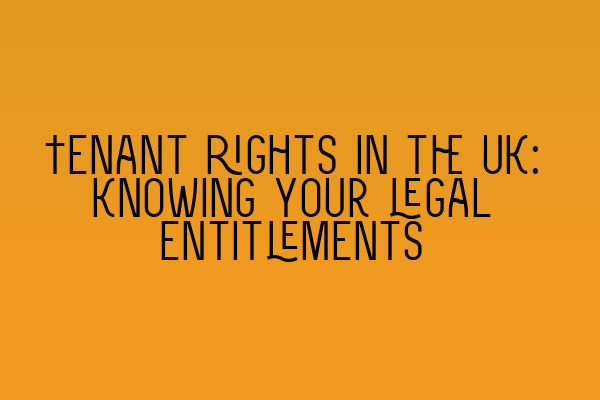Tenant Rights in the UK: Knowing Your Legal Entitlements
Introduction
As a tenant in the UK, it is crucial to understand your rights and legal entitlements. Renting a property may seem straightforward, but there are specific laws in place to protect your interests as a tenant. Whether you are renting a residential or commercial property, this article will provide an overview of the essential tenant rights in the UK and guide you on how to navigate common legal challenges.
To ensure you are well-informed, it is essential to consult a qualified solicitor who specializes in property and land law. At SQE Property Law & Land Law, our team of experts is dedicated to helping tenants understand their rights and resolving legal issues effectively.
Tenant Rights in the UK
1. Right to a Written Tenancy Agreement
Before renting a property, both parties should sign a written tenancy agreement. This document outlines the terms and conditions of the tenancy, including the rent amount, payment schedule, duration of the tenancy, and responsibilities of both the tenant and landlord. A written tenancy agreement provides clarity and safeguards your rights as a tenant.
2. Right to Fair Rent
As a tenant, you have the right to fair rent. The landlord must charge a reasonable rent amount based on market rates. In some cases, the rent may be subject to rent control or rent increase restrictions. If you believe your rent is unreasonably high, you can seek advice from a solicitor to review the rental agreement and determine whether it complies with the market standards.
3. Right to a Safe and Habitable Property
Your landlord is legally obligated to provide you with a safe and habitable property. This means that the property must be in a good state of repair, free from any hazards that may pose a threat to your health and safety. If you discover any defects or maintenance issues that render the property uninhabitable, you have the right to request repairs from your landlord.
4. Right to Privacy
As a tenant, you have the right to privacy within your rented property. Although the landlord may have the right to access the property for inspections or repairs, they must provide reasonable notice in advance. Your landlord cannot enter the property without your permission, except in cases of emergency or with a court order.
5. Right to a Return of the Deposit
When you rent a property, you may be required to pay a security deposit. This deposit is held by the landlord or a third-party scheme as a safeguard against any damages to the property. At the end of the tenancy, your landlord must return the deposit within a reasonable timeframe, minus any deductions that may be necessary to cover damages or unpaid rent. If you disagree with the deductions made by your landlord, you have the right to dispute them through a deposit protection scheme or seek legal advice.
Legal Challenges and Avoiding Common Pitfalls
Renting a property can sometimes lead to legal challenges and disputes. Understanding your rights and responsibilities as a tenant can help you avoid common pitfalls. However, if you find yourself facing legal issues, it is crucial to seek professional legal assistance to protect your interests.
Legal challenges in property transactions often require expert guidance. To gain a comprehensive understanding of legal challenges in property transactions, visit our article on Legal Challenges in Property Transactions: A Comprehensive Guide.
To ensure you are fully prepared to navigate property law questions, read our article on Dominate Property Law Questions: Avoiding Common Pitfalls. Avoiding common pitfalls can save you time and money in legal disputes.
Proper preparation is key to achieving success in your land law exams. For revision tips and advice on how to ace your exam preparation, check out our article on Land Law Revision Tips: Ace Your Exam Preparation.
If you are considering a property transaction involving mortgages, it is essential to understand the essential considerations. Read our article on Mortgages and Land Law: Essential Considerations for Property Transactions to ensure you make informed decisions.
Lastly, environmental ethics play a vital role in land law. Balancing development and sustainability is crucial. To gain insight into the topic, read our article on Environmental Ethics in Land Law: Balancing Development and Sustainability.
Conclusion
Knowing your rights as a tenant is crucial to having a positive rental experience and preventing legal disputes. Familiarize yourself with the rights mentioned in this article and seek legal advice when necessary. At SQE Property Law & Land Law, we have extensive experience in assisting tenants with their legal matters. Contact us today to ensure your rights as a tenant are protected.
